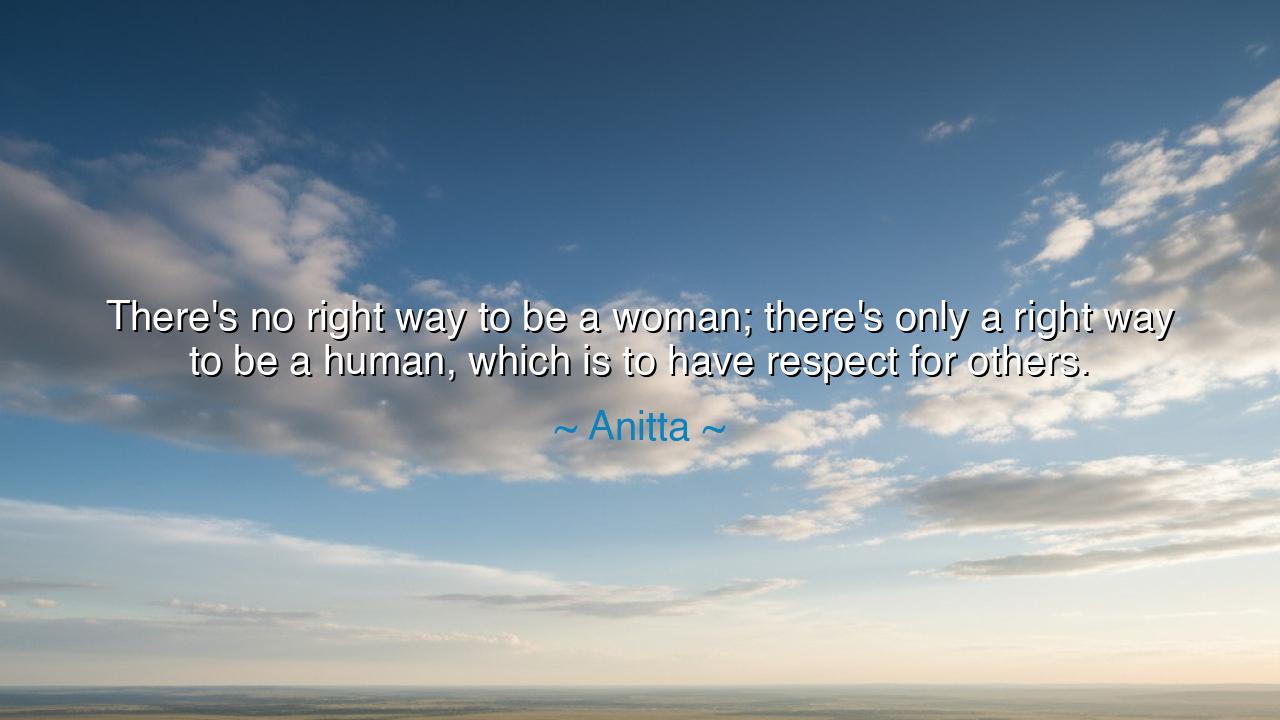
There's no right way to be a woman; there's only a right way to
There's no right way to be a woman; there's only a right way to be a human, which is to have respect for others.






When Anitta said, “There’s no right way to be a woman; there’s only a right way to be a human, which is to have respect for others,” she was not only speaking as an artist or a public figure — she was speaking as a sage of her time, one who had seen the endless masks that society places upon women and chose instead to lift them away. In her words lives a truth as old as humankind and as urgent as the present hour: that dignity, not conformity, defines the worth of a person. She reminds us that the measure of a woman, or of any soul, is not found in obedience to others’ expectations but in the respect she shows and the respect she demands. Her voice carries the rhythm of freedom, tempered with the wisdom of compassion — the eternal law that to be truly human is to see the divine in another.
For centuries, humanity has tried to define the “right way” for a woman to live. From the queens of antiquity to the laborers in the fields, from the poets in cloisters to the warriors in rebellion, women have been told how to speak, dress, love, and dream. But Anitta’s declaration cuts through that ancient fog of judgment like a sword through silk. She tells us that the question was flawed from the beginning. There is no “right way to be a woman”, for womanhood, like the sea, takes a thousand forms — nurturing, fierce, gentle, commanding, wild, and serene. The true question, she says, is not how to fit a mold, but how to live with honor and respect, as one human soul among many.
The origin of her insight rises from her own life, forged in the fire of experience. Born in Brazil, Anitta rose from humble beginnings to become a voice heard around the world — a symbol of both self-expression and strength. She has faced criticism for daring to live openly, for embracing her power and sexuality without apology. Yet it was precisely through this storm of judgment that she discovered a universal truth: that liberation does not lie in rebellion for its own sake, but in the refusal to let others dictate one’s essence. Her quote is not just a defense of women; it is a manifesto for humanity. She invites both women and men to transcend labels, to meet each other not as roles or symbols, but as equals bound by mutual respect.
In the annals of history, we find echoes of her wisdom. Consider Hypatia of Alexandria, the philosopher and mathematician of ancient Egypt. In an age when women were barred from the halls of learning, she stood before the scholars of the greatest library in the world and taught them about the stars and the soul. Her enemies feared her not for her gender, but for her brilliance, and they destroyed her body but not her legacy. Hypatia, like Anitta, refused to live by a “right way” for women — she chose instead the right way for a human, which was to seek truth and honor the dignity of others. Her life is a reminder that the pursuit of respect, not approval, is the true path to greatness.
Anitta’s words also carry a quiet warning: that respect cannot exist where judgment reigns. When we define one another by gender, by appearance, by conformity to custom, we forget the sacred equality that binds us all. The ancients believed that every person carried a spark of the divine, the anima mundi — the soul of the world. To respect others, then, is not merely courtesy; it is reverence. It is to recognize in each being — woman, man, child — the reflection of something eternal. In this light, her quote becomes a moral commandment: to live as humans first, and as identities second; to treat one another not as categories, but as souls walking the same difficult path.
The power of her message lies in its simplicity. There is no formula for womanhood, just as there is no formula for being human. To be a woman is to be infinite, to shape oneself as freely as the wind shapes the dunes. Yet with that freedom comes the sacred duty of respect — for oneself, and for others. Respect does not demand agreement, nor does it require submission. It is the recognition of shared humanity in all its contradictions. It says: I may not be you, but I see you. It is the bridge between difference and unity, between isolation and peace.
And so, the lesson of Anitta’s words is this: live without apology, but live with respect. Do not allow the world to confine you to its definitions — neither of womanhood, manhood, nor any other boundary it imagines. Stand in your truth, but honor the truth of others. When you look upon another person, see not what separates you, but what binds you — the beating heart, the longing for love, the desire to be seen. This, and this alone, is the right way to be human.
Therefore, let these words be carried like a torch into the generations to come: There is no right way to be anything, except kind. There is no higher art than respect, no greater power than empathy, and no truer identity than humanity itself. As Anitta teaches, to be a woman is not to fit a role, but to embody freedom — and to be human is to wield that freedom with grace. May we live so that our respect becomes our legacy, and our humanity, our shared crown.






AAdministratorAdministrator
Welcome, honored guests. Please leave a comment, we will respond soon